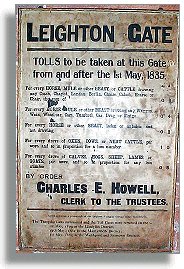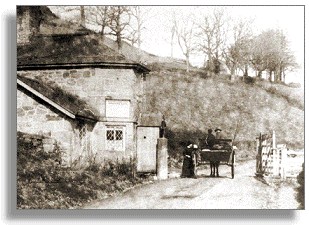The ports near the mouth of the River
Dyfi at Aberdyfi and Derwenlas once gained a lot of trade because the
cross-country roads in the district
were very bad for many years.
It wasn't until local turnpikes were
authorised by Parliament that decent roads were built. These roads were
paid for by invested money, and tolls
were charged for their use by travellers.
The Turnpike Trust built the road between Machynlleth and Aberdovey in
1827 - just 10 years before Victoria
came to the throne.
There were local toll houses and gates at Lledfair
Gate on the Aberystwyth Road and at Mengwyn
Gate at the eastern end of Maengwyn Street. The
Dyfi Bridge Gate and the Ffridd Gate
controlled other routes, and there were other gates further from the town
in the outlying district.
|
This
copy of the 1835 Tollgate sign
originally displayed at the Leighton Gate near Welshpool, can be
seen at
Powysland Museum in Welshpool. The notice said that the charges were 6 pence for coaches, 4 pence for wagons and carts, and 2 pence for horses. Every 20 cows were charged 1 shilling, and every 20 sheep were charged 8 pence ! |
